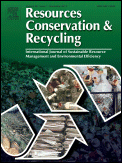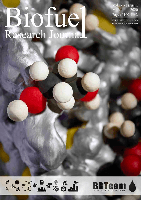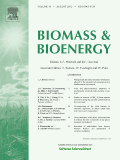
Biofuels-UK
Scope & Guideline
Advancing sustainable energy solutions for a greener future.
Introduction
Aims and Scopes
- Sustainable Biofuel Production:
Research exploring efficient methods for producing biofuels from a variety of feedstocks, including waste cooking oils, agricultural residues, and microalgae, focusing on both first and second-generation biofuels. - Technological Innovations:
Investigations into new technologies and methodologies for biofuel synthesis, including enzymatic treatments, advanced catalysts, and thermochemical processes to enhance yield and efficiency. - Environmental Impact and Life Cycle Assessment:
Studies assessing the environmental sustainability of biofuel production processes, including life cycle assessments, carbon footprint analyses, and ecological implications of biofuel use. - Policy and Economic Analyses:
Research addressing the socio-economic factors influencing biofuel adoption, including policy evaluations, market dynamics, and the economic feasibility of biofuel technologies. - Process Optimization and Modeling:
Development of mathematical and computational models to optimize biofuel production processes, focusing on parameters such as energy efficiency, yield maximization, and cost reduction.
Trending and Emerging
- Microalgae as Feedstock:
An increasing number of studies focus on utilizing microalgae for biofuel production, highlighting their potential due to high lipid content and rapid growth rates, as well as their ability to sequester CO2. - Waste Valorization:
Research is trending towards the conversion of waste materials, including agricultural residues and municipal solid waste, into biofuels, emphasizing circular economy principles and resource recovery. - Advanced Catalysts and Nanotechnology:
The application of nanotechnology and advanced catalysts in biofuel production processes is gaining traction, showcasing innovations that improve reaction efficiency and product quality. - Biogas and Biomethane Production:
There is a surge in interest in biogas production from various organic substrates, with a focus on optimizing anaerobic digestion processes and exploring biogas as a renewable energy source. - Integrated Biofuel Systems:
Emerging research is exploring integrated systems that combine different renewable energy sources, including biofuels, solar, and wind energy, to enhance energy security and sustainability.
Declining or Waning
- Traditional Feedstocks for Biofuels:
There is a noticeable decrease in research centered around conventional feedstocks such as corn and sugarcane for biofuel production, as the focus shifts towards more sustainable and diverse feedstock options. - Basic Biofuel Production Techniques:
Studies employing traditional methods of biofuel production, such as simple transesterification without advanced optimization or catalysis, are appearing less frequently as the field advances towards more sophisticated and efficient techniques. - Single-Fuel Systems:
Research on the use of biofuels in isolation, without consideration of hybrid systems or blends with other renewable energy sources, is becoming less common as the industry moves towards integrated energy solutions.
Similar Journals

RESOURCES CONSERVATION AND RECYCLING
Pioneering research in conservation and recycling practices.RESOURCES CONSERVATION AND RECYCLING, published by Elsevier, is an esteemed journal that has been at the forefront of academic discourse since its inception in 1988. Focusing on the critical fields of resource management, recycling, and sustainability, this journal has established itself as a leading platform for innovative research, holding a prestigious position in the Q1 quartile for both Economics and Econometrics, and Waste Management and Disposal. With a remarkable Scopus ranking of #4 in its respective categories, it represents the pinnacle of scholarly contributions, aimed at fostering knowledge that drives efficient resource utilization and effective waste management practices. The journal's commitment to advancing the understanding of economic implications and environmental impacts of resource conservation is reflected in its diverse array of articles, case studies, and reviews. Although it is not an open-access journal, the valuable insights it offers are essential for researchers, professionals, and students who are dedicated to addressing pressing environmental challenges and enhancing sustainable practices on a global scale.

Biomass Conversion and Biorefinery
Transforming biomass into sustainable energy solutions.Biomass Conversion and Biorefinery, published by Springer Heidelberg, is a prominent peer-reviewed journal dedicated to advancing the field of renewable energy and sustainable practices. With ISSN 2190-6815 and E-ISSN 2190-6823, this journal serves as a vital platform for researchers, professionals, and students focusing on the valorization of biomass and the development of biorefinery technologies. Notably, it holds a respectable impact factor and is categorized in the Q2 quartile of Renewable Energy, Sustainability and the Environment, indicating its strong influence within the academic community. Covering a wide range of topics from biomass feedstock characterization to innovative bioconversion processes, the journal aims to facilitate interdisciplinary collaboration and knowledge exchange. As it spans in scope from 2011 to 2024, audience members can benefit from timely research insights that contribute to sustainable energy solutions in a world increasingly focused on environmental stewardship.

GLOBAL CHALLENGES
Inspiring Action Through Multidisciplinary Research.GLOBAL CHALLENGES is a leading multidisciplinary journal published by Wiley-V C H Verlag GmbH, dedicated to addressing the critical and complex issues faced by our global society today. Since its inception in 2017, the journal has embraced an Open Access model, ensuring that its innovative research is readily available to a wider audience, fostering collaboration and knowledge sharing. With an impressive Q1 ranking in the Multidisciplinary category for 2023, it positions itself among the top 8% of journals in the field, further solidified by its 93rd percentile rank in Scopus. Covering a broad range of topics that intersect various disciplines, the journal seeks to inspire researchers, professionals, and students alike to engage with and contribute to solutions that resonate across diverse sectors. The ongoing commitment to advancing scientific knowledge and tackling pressing global challenges makes GLOBAL CHALLENGES an essential resource for anyone invested in the future of our planet.

Biotechnology for Biofuels
Pioneering research for a greener biofuel future.Biotechnology for Biofuels, published by BMC in the United Kingdom, stands at the forefront of renewable energy research. As an open-access journal since 2008, it has become a critical platform for sharing innovative research and developments in the field of applied microbiology and biotechnology, particularly in the sustainable production of biofuels. With an impressive 2023 ranking of Q1 in multiple categories—including Applied Microbiology and Biotechnology, Biotechnology, and Management, Monitoring, Policy and Law—this journal offers unparalleled visibility and accessibility for your work. Its Scopus metrics underscore its influence, with rankings in the top 10% across several categories, emphasizing its integral role in advancing research on environmental sustainability and bioenergy solutions. Researchers, professionals, and students alike will find in this journal a rich resource for current studies, methodologies, and policies essential for navigating the complex landscape of biofuel technology.

Biofuel Research Journal-BRJ
Leading the charge in biofuel research and environmental science.Biofuel Research Journal (BRJ) is a premier open-access publication that has been at the forefront of advancing knowledge in the field of biofuels since its inception in 2014. Published by Alpha Creation Enterprise in Malaysia, BRJ disseminates high-quality research that spans multiple disciplines, including Biotechnology, Chemical Engineering, and Environmental Science. With an impressive Q1 ranking across various categories in 2023 and a robust Scopus ranking positioning it among the top journals in its field, BRJ is dedicated to promoting innovative solutions that address contemporary energy challenges. The journal serves as a vital resource for researchers, professionals, and students engaged in sustainable energy, offering a platform for sharing cutting-edge findings and fostering interdisciplinary collaboration. With its commitment to open access, BRJ ensures that its content is widely available, supporting the global pursuit of renewable energy and environmental stewardship.

BIOMASS & BIOENERGY
Transforming Waste into Renewable WealthBIOMASS & BIOENERGY, published by Pergamon-Elsevier Science Ltd, is a premier academic journal focusing on the interdisciplinary fields of biomass and bioenergy research. With its impressive impact reflected in its 2023 Q1 rankings across multiple categories, including Agronomy and Crop Science, Forestry, Waste Management and Disposal, and a solid Q2 in Renewable Energy, Sustainability and the Environment, this journal stands at the forefront of advancing knowledge in renewable resources and sustainable practices. Established in 1991, it serves as a vital platform for researchers, professionals, and students to disseminate groundbreaking studies and innovative findings that shape the future of renewable energy. Though it does not currently offer open access, the journal's high ranking on Scopus, particularly its 95th percentile rank in key agricultural and environmental science categories, underscores its significance in promoting critical discourse and scientific advancements in biomass utilization and energy generation.

BioResources
Connecting researchers to foster a sustainable future.BioResources is a pioneering open access journal launched in 2006, dedicated to disseminating knowledge at the intersection of bioengineering, environmental engineering, and waste management. Published by NORTH CAROLINA STATE UNIVERSITY DEPARTMENT OF WOOD & PAPER SCIENCE, this journal serves as a vital platform for researchers and professionals to explore the sustainable use of biomaterials and renewable resources. With an impact reflected through its Scopus rankings, including a respectable position in the 2023 quartile rankings across several relevant categories, BioResources is committed to advancing scientific discourse and enhancing the understanding of bioresource utilization. The journal not only supports high-quality research but also encourages contributions that shape environmental policies and practices. Accessible globally, it invites active participation from scholars aiming to contribute to a more sustainable future. Researchers, professionals, and students alike will find valuable insights and groundbreaking research within its pages as it continues to foster knowledge and innovation in the field.

Renewable Energy
Empowering a Sustainable Future.Renewable Energy is a prestigious international journal published by PERGAMON-ELSEVIER SCIENCE LTD, dedicated to advancing the field of renewable energy technologies and their applications. Since its inception in 1991, this journal has provided a critical platform for researchers, professionals, and students to explore innovative solutions in renewable energy, sustainability, and environmental protection. With an impressive impact factor and ranked in the top quartile (Q1) of its category, Renewable Energy is recognized for its high-quality, peer-reviewed research that significantly contributes to the scientific and professional discourse in the sector. The journal is indexed in Scopus, holding an esteemed rank of #21 out of 270 in its field, underscoring its influence and reach. Researchers can access the journal’s articles through traditional subscriptions, ensuring a broad dissemination of vital knowledge that supports the global transition to sustainable energy sources. Addressed from its headquarters in Oxford, England, Renewable Energy is crucial for anyone involved in the journey towards a sustainable future, fostering collaboration and innovation in a critical area of environmental science.

Biotechnology for Biofuels and Bioproducts
Empowering a Greener Tomorrow Through Biofuels and BioproductsBiotechnology for Biofuels and Bioproducts is a premier international journal published by BMC, situated in the United Kingdom, focusing on the critical intersection of biotechnology and sustainable energy solutions. Established as an Open Access platform in 2022, this journal aims to disseminate high-quality research that advances our understanding of biofuels, bioproducts, and their applications within environmental sustainability. With its commendable Q2 ranking in multiple relevant categories including Applied Microbiology and Biotechnology and Renewable Energy, this journal serves as a vital resource for researchers, industry professionals, and students seeking to explore innovative biotechnological approaches to address global energy challenges. The journal emphasizes interdisciplinary research, fostering collaboration among scientists in biotechnology, environmental science, and policy-making. As it continues to publish impactful findings until 2024, Biotechnology for Biofuels and Bioproducts remains essential for those dedicated to advancing sustainable methodologies in energy and resource management.

International Journal of Energy and Environmental Engineering
Innovating Today for a Greener TomorrowInternational Journal of Energy and Environmental Engineering, published by SPRINGER HEIDELBERG, is a leading platform for innovative research in the fields of energy and environmental engineering. With an ISSN of 2008-9163 and an E-ISSN of 2251-6832, this journal is dedicated to advancing knowledge and technology that intersects both energy and environmental disciplines. Recognized in the Q2 category for 2023 in both Energy (miscellaneous) and Environmental Engineering, this interdisciplinary journal aims to address global challenges in energy sustainability and environmental protection. The journal also boasts strong Scopus rankings, standing at Rank #73 in Environmental Science and Rank #28 in General Energy, highlighting its influential role within the academic community. Researchers, professionals, and students are encouraged to contribute and engage with cutting-edge studies that push the boundaries of knowledge and innovation in energy and environmental engineering.